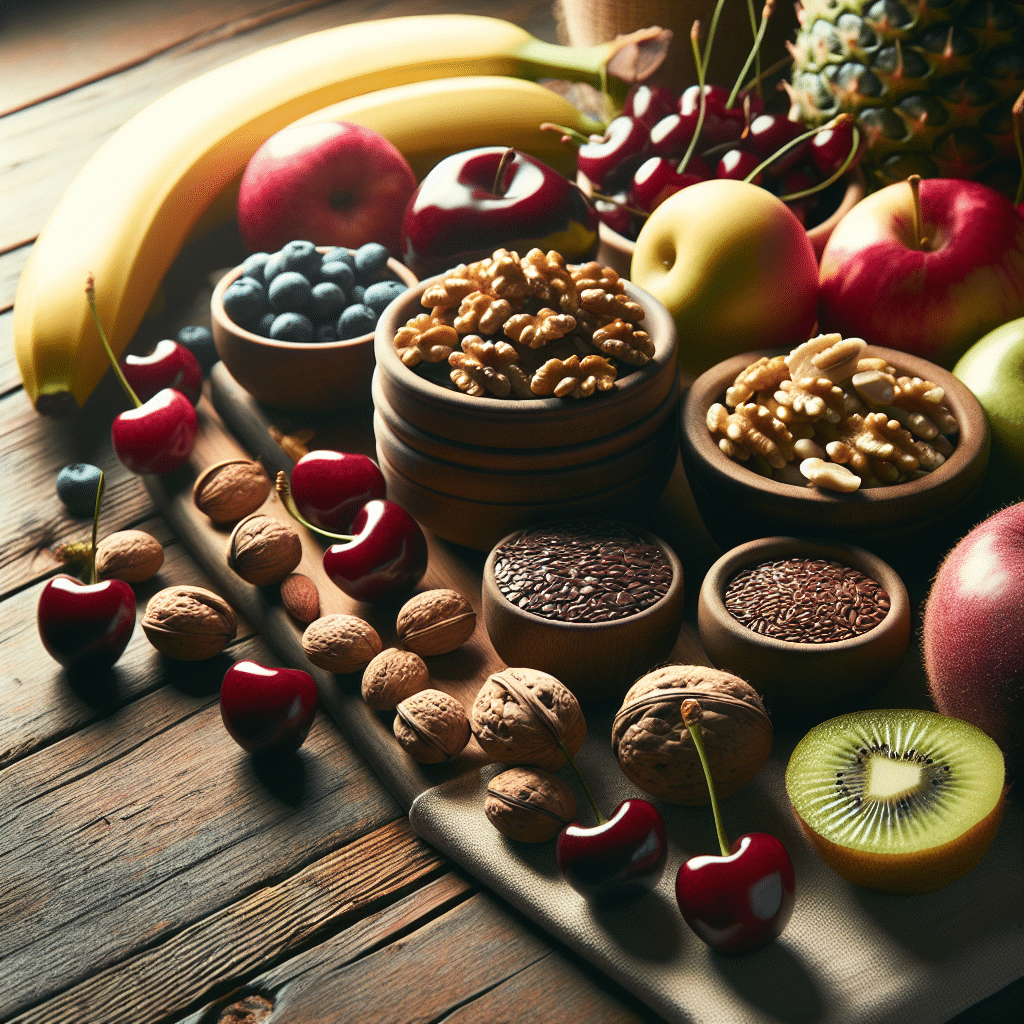Understanding Melatonin and Its Importance
Melatonin is a hormone primarily produced by the pineal gland in the brain. This naturally occurring substance plays a crucial role in regulating sleep-wake cycles, known as circadian rhythms. Melatonin production typically increases in the evening as it gets dark and decreases with exposure to light, helping signal to our body that it’s time to sleep. Insufficient melatonin levels can lead to sleep disorders, insomnia, irregular sleep patterns, and even mood disturbances. To counteract these issues naturally, certain superfoods can be incorporated into your diet to boost melatonin production.
Key Nutrients for Melatonin Boosting
Before diving into specific superfoods, it’s essential to understand which nutrients aid melatonin production. These include:
- Tryptophan: An essential amino acid that the body uses to produce serotonin, which is then converted into melatonin.
- Magnesium: Supports melatonin production by providing a calming effect on the central nervous system.
- Vitamin B6: Plays a role in the conversion of tryptophan to serotonin, significantly impacting melatonin synthesis.
- Zinc: Another mineral that assists in the production and regulation of melatonin.
Superfoods to Enhance Melatonin Production
1. Cherries
Cherries, particularly tart cherries, are a potent natural source of melatonin. Research indicates that drinking tart cherry juice may improve sleep duration and quality. Incorporating cherries into your diet can easily be done by adding them to smoothies, salads, or oatmeal. They contain both melatonin and tryptophan, making them an excellent choice for those seeking natural sleep aids.
2. Kiwi
Kiwi is not only a delicious fruit but also a fantastic superfood for sleep. Studies have shown that regular consumption of kiwi (about two per day) can significantly increase sleep duration and efficiency. Kiwi is rich in antioxidants, serotonin, and vitamins C and E, which contribute to improved sleep quality. Try enjoying them fresh, adding them to fruit salads, or blending them into smoothies.
3. Fatty Fish
Fatty fish like salmon, tuna, and mackerel are high in omega-3 fatty acids and vitamin D, both linked to better sleep quality. These nutrients can increase serotonin production, indirectly boosting melatonin levels. Aim to include fish in your diet 2-3 times weekly, prepared through methods like grilling, baking, or steaming to preserve their nutritional benefits.
4. Milk
Milk has been traditionally recommended for sleep due to its tryptophan content. In addition, dairy products contain calcium, which helps the brain use tryptophan to manufacture melatonin. Enjoy warm milk before bed, or use yogurt and cheese as healthy late-night snacks.
5. Oats
Whole grains, especially oats, are another excellent superfood that may help improve melatonin levels. Oats contain carbohydrates and an amino acid named tryptophan, which are fundamental for increasing serotonin and subsequently melatonin. Incorporate oats into breakfast in the form of oatmeal or overnight oats, and consider adding fruits and nuts for an extra nutritious boost.
6. Bananas
Bananas are rich in magnesium and potassium, both of which help relax muscles and nerves, promoting better sleep. Additionally, they contain tryptophan, which further aids melatonin production. Enjoy bananas as a snack or blend them into smoothies for a nutritious treat any time of the day.
7. Almonds
Almonds are not just a healthy snack but also a fantastic source of magnesium required for sleep regulation. Studies suggest that magnesium deficiency may affect sleep quality negatively. A small handful of almonds before bedtime can help regulate melatonin production. They can be added to salads, oatmeal, or eaten raw.
8. Walnuts
Another nut that supports melatonin production is walnuts. They are a rich source of omega-3 fatty acids and contain melatonin itself. Consuming a small portion of walnuts can enhance sleep quality and duration. Add them to yogurt, salads, or as a topping on baked goods for a nutty flavor.
9. Spinach
Spinach is an exceptional source of magnesium and folate, both known to influence melatonin production positively. Including spinach in your diet can promote not only better sleep but also improved mood. Add fresh spinach to salads, smoothies, or omelets to maximize your nutrient intake.
10. Tart Pomegranate
Pomegranates also contribute positively to melatonin levels and overall sleep enhancement. Rich in antioxidants, pomegranate juice may reduce stress and promote relaxation. Incorporate pomegranate seeds into salads, yogurt, or savory dishes for an uplifting taste.
Timing and Meal Preparation for Optimal Melatonin Support
Incorporating these superfoods into your diet is beneficial, but timing and the method of preparation can maximize their melatonin-boosting effects. Consuming foods high in tryptophan a few hours before bedtime is ideal. Here are some tips:
- Evening Meals: Aim for a balanced meal that includes proteins (like fatty fish or chicken) and carbohydrates (like whole grains or fruits). This combination can facilitate the efficient use of tryptophan to produce melatonin.
- Snack Wisely: If you need a late-night snack, consider options like a small bowl of yogurt with walnuts or a banana with almond butter.
- Warm Beverages: Herbal teas, particularly chamomile or valerian root tea, can help relax the body and complement your intake of melatonin-boosting foods.
Lifestyle Modifications for Enhanced Sleep
In addition to a diet rich in melatonin-boosting superfoods, other lifestyle changes can improve sleep quality:
- Sleep Hygiene: Create a dark, cool, and quiet environment for sleep. Consider blackout curtains and white noise machines.
- Routine: Establish a consistent sleep schedule by going to bed and waking up at the same time each day.
- Limit Blue Light Exposure: Reduce the use of screens before bedtime as they can disrupt melatonin secretion due to blue light.
Conclusion
Natural strategies for enhancing melatonin production involve a combination of dietary choices and lifestyle modifications. By incorporating these superfoods into your daily meals and establishing healthy sleep habits, you can support your body’s natural sleep mechanisms, leading to improved sleep quality and overall well-being.
